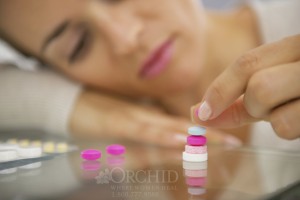Women, Mental Illness, and Addiction

Women, Mental Illness, and Addiction: Dual Diagnosis
For many women, mental illness, and addiction go hand-in-hand. For that reason, there is specialized treatment available, known as dual diagnosis drug treatment. Dual diagnosis is a medical term that simply means there are two or more disorders occurring at the same time – “co-occurring” or “comorbidity” – and, in the case of addiction treatment, those disorders include a substance abuse disorder and a mental illness, such as depression, anxiety, bi-polar, and so on.
Anxiety, borderline personality disorder (BPD), and depressive disorders, such as major or clinical depression and bi-polar disorder, tend to be both more prevalent and more pronounced, or severe, among women. This is thought to prevent women who are addicted from seeking help for their substance abuse issues. Therefore, the best drug treatment programs specialize in the treating women holistically by addressing all of the “parts” that make up the “whole” person. That said, the best, most effective way to treat someone with multiple conditions is to simultaneously treat her conditions. This is of the utmost benefit to a woman’s recovery.
Women, Mental Illness, and Addiction: Self-Medication
Women who turn to turn to substances may want to numb their feelings of anxiety or depression in order to self-medicate. For example, the use of benzodiazapines, or benzos, such as Klonopin, Valium, or Xanax will initially help alleviate anxiety in the short run but can actually lead to persisting and worsening anxiety over time. Women who take anti-anxiety medication, whether prescribed or taken illicitly, will find that they build up a tolerance to their usual dosage and begin taking more and more, and at higher doses, whether they’re instructed by their doctor or they take it upon themselves to increase their dosage by taking more.
This is dangerous territory. Women in this situation become both physically and psychologically dependent on their meds and cannot simply stop – the anxiety comes back full-force and is accompanied by physical symptoms that are potentially life-threatening.
Other women turn to alcohol to achieve this same affect. And others, still, combine these drugs for a more profound effect.
Experts have found that women are more likely than men to use alcohol in order to self-medicate. This might be due to the higher rate of trauma among women when compared to their male counterparts. This is noteworthy because, often times, unresolved trauma and abuse issues are at the root of the addiction and therefore the reason to feel the need to self-medicate. When you factor in mental illness, such as depression, women are more than twice as likely as men to start drinking heavily due to their history of depression; depression is possibly a significant trigger for alcohol use and abuse in women.
Women, Mental Illness, and Addiction: Which came first?
There is a chicken-or-the-egg debate when it comes to women, mental illness, and addiction. For some women, the mental disorder preceded the substance abuse – as a result from efforts to self-medicate. For others, the profound effect that chemicals have on the brain structure and function can cause what appear to be mental illness such as depression and anxiety. In either case, it is essential that she receive specialized drug treatment that simultaneously addresses her mental illness.
If you or someone you love is struggling with substance abuse or addiction and a mental illness, help is available. Call toll-free 1-800-777-9588 to speak directly with an Addiction Specialist. The Orchid Recovery Center specializes in drug treatment for women, mental illness, and addiction.
